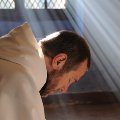 I had the privilege Monday evening of viewing Of Gods and Men (Des hommes et des dieux) at the Toronto International Film Festival. Directed by Xavier Beauvois, the film won both the Ecumenical Award and the Grand Prix du Jury Award at Cannes this year.
I had the privilege Monday evening of viewing Of Gods and Men (Des hommes et des dieux) at the Toronto International Film Festival. Directed by Xavier Beauvois, the film won both the Ecumenical Award and the Grand Prix du Jury Award at Cannes this year.
If you’re in the Toronto area and still plan to catch a film at TIFF, there’s another screening on Friday afternoon (September 16).
“Snapshot”
Of Gods and Men is the moving true account of the Trappist community of Mt. Atlas, Algeria, and their response to the rising violence of Islam extremists in the mid-1990s. Despite the breathtaking cinematography, to those accustomed to a Hollywood version of things, this film is in many ways a minimalist portrayal. There is no romanticizing of monastic life, nor of martyrdom. These seem to be ordinary men who dig deep–into the grace of their vocation, into their faith, into their very selves–to be faithful to their commitment. Instead of choosing to shock, the film draws its audience in, immersing us in the paschal experience of these reflective, prayerful, and peaceful men who choose to witness to hope in the midst of a world disintegrating around them.
Strengths
I am not overly familiar with the story of the monks, and the exact circumstances of their deaths are still unknown, but the film is done in a way that almost plays down the drama. It feels very factual. There is no sensationalizing, even though the decisions of the monastic community has life-and-death consequences. My impression as a woman religious is that this film is a faithful rendering of both the monks’ experience and of the way they would have liked their experience interpreted. The humanness of the monks is candidly expressed and portrayed, and the prayerful routine of their life echoes in our consciousness, much like the chant reverberates in their simple chapel.
 I especially appreciate the way the film highlights community. The monks are a part of the larger village community, engaged in serving the needs of the villagers. And while certain monks are more noticeable or memorable, no one monk stands out as the protagonist. It would have been very easy for the filmmaker to focus on the superior of the community, or on one member. Instead, he allows the beauty of community life to shine forth, showing the place that each monk holds, revealing subtly the strength that comes from so deeply sharing a commitment to Christ and God’s people. The monks move together, unique individuals who are ultimately faithful to their commitment to build unity and peace, both within and outside of the monastic walls.
I especially appreciate the way the film highlights community. The monks are a part of the larger village community, engaged in serving the needs of the villagers. And while certain monks are more noticeable or memorable, no one monk stands out as the protagonist. It would have been very easy for the filmmaker to focus on the superior of the community, or on one member. Instead, he allows the beauty of community life to shine forth, showing the place that each monk holds, revealing subtly the strength that comes from so deeply sharing a commitment to Christ and God’s people. The monks move together, unique individuals who are ultimately faithful to their commitment to build unity and peace, both within and outside of the monastic walls.
The film gets off to a slow start, inviting the audience into the rhythm of the monastic life. At first, the deliberate tempo of the film seems to conflict with the story–the reflective, attentive, peaceable behavior of the monks versus the extremism of the fanatics, the ambiguous, threatening government presence, and the fear of the ordinary people. Yet through this slower pacing, we are invited in to reflect, like the monks, on what this increasingly dangerous conflict means.
The paradox of martyrdom is highlighted by the wonderfully understated acting, and the realistic dialogue, which also uses Scripture and some of the Testament of the superior as he faced his death.
Limitations
I didn’t find any, although this film’s European sensibilities may make it less popular here in North America.
The intentional pacing shouldn’t limit the film’s audience because it combines the strength of a documentary-like reality with the added realism that a feature can give when directed by a filmmaker who is not obsessed with impressing or shocking, but instead seeks to sensitively draw out the depth of the experience of the protagonists.
The film makes the audience work more than a typical Hollywood film. Of Gods and Men has many beautiful and touching moments, but few easily “satisfying” moments that resolve the suspenseful dramatic question building up through every scene–what will these ordinary men do in the face of their possible murders? We share the unrelenting strain with them, and it forces us to reflect on what we would do in their places.
How is this film a Window to the Soul?
Of Gods and Men is a true “window to the soul” that dazzles the audience cinematically, but even more so with the light of the Gospel as it was incarnated in the lives of these peace-loving men. They were ordinary men who did not want to die as martyrs. The film doesn’t let us look away from the painful paradox they lived in their radical commitment to Christ, nor from the heroism, however reluctant, of their choice.
